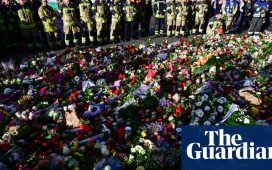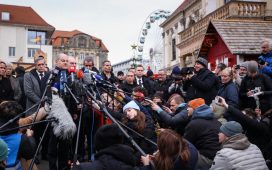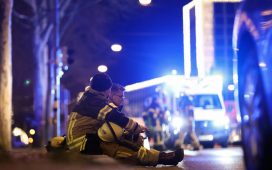
The US has boosted its forces in the Middle East in expectation of an Iranian attack on Israel. Such an attack would be to avenge last weekend’s strike by Israel which caused significant damage to Iran’s air defence and rocket production facilities.
CENTCOM, the US Central Command, announced that B-52 long-range bombers have arrived in the region to join the already extensive American military build-up. CENTCOM chief Gen Michael Kurilla visited Israel over the weekend for top-level security consultations and an inspection of the THAAD American missile defence system battery that was deployed last month by the US military.
Iran’s supreme leader Ali Khamenei on Saturday threatened Israel and the US with “a crushing response” over attacks on Iran and its allies. A more moderate tone was sounded by Iran’s president Masoud Pezeshkian, who stated on Sunday that a potential ceasefire between Israel and Iran’s allies “could affect the intensity” of Tehran’s response to Israel’s recent strikes.
The attack Iran is planning against Israel will be “the largest in quantity and quality so far”, Iranian sources told the London-based Qatari Al-Araby Al-Jadeed newspaper.
There were unconfirmed reports that Tehran would delay its response until after Tuesday’s US election, fearing an attack would boost support for Republican presidential candidate Donald Trump.
Israel believes Iran may this time choose Iraq and/or Yemen to launch a retaliatory strike, possibly involving a combined attack of UAVs and ballistic missiles, to be carried out by pro-Iranian militias. An attack from Iraq would give Israel less time to prepare as Iraq is closer to Israel than Iran.
Israel has said that any action taken by Iranian proxies will be considered a direct attack by Tehran, and has said Israel will hit back against Iranian territory.
According to the Axios news site, Washington has warned Iran in recent days against launching another attack on Israel, adding that it would not be able to restrain Israel if it attacks again. “We told the Iranians: We won’t be able to hold Israel back, and we won’t be able to make sure that the next attack will be calibrated and targeted as the previous one,” a US official was quoted as saying.
At least 31 people were killed during Israeli attacks in Gaza on Sunday, Palestinian medics said. Nearly half of the deaths were in northern areas where the army has waged a month-long campaign, centred on Jabalia, north of Gaza city. It says it aims to prevent Hamas regrouping.
Palestinians said the new aerial and ground offensives and forced evacuations were “ethnic cleansing” aimed at emptying two north Gaza towns and a camp of their populations to create buffer zones. Israel denies this, saying it is fighting Hamas militants who launch attacks from there.
More than 43,300 Palestinians have been killed in Gaza since the October 7th, 2023, Hamas attack on southern Israel in which 1,200 people were killed, according to Israel, and 251 kidnapped.
Despite the ongoing violence the polio vaccination campaign in northern Gaza resumed on Sunday. Gaza recorded its first case of polio in 25 years in August, which left a baby boy paralysed and prompted the roll-out of the programme.
The Gaza ministry for health said Israel’s military offensive in northern Gaza was stopping them from vaccinating thousands of children in Jabalia, Beit Lahiya, and Beit Hanoun. It said one clinic came under Israeli fire while parents brought their children for the anti-polio dose on Saturday, where four children were injured.
The head of the World Health Organisation said in a statement the incident took place despite a humanitarian pause agreed upon by the two warring parties, Israel and Hamas, to allow the vaccination campaign.









